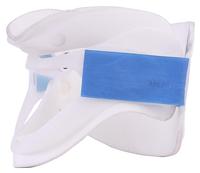


Dear Readers,
Steffie is a 27-year-old front desk clerk at a busy business place in Kingston. Steffie is concerned that her neck feels stiff a lot of the time, especially at the end of the work day. She wonders if this could be because of her posture while sitting at her desk and working with her computer on a recent project, or if stress could also cause neck stiffness, for her work is stressful.
Steffie, the answer is, of course that neck stiffness is commonly caused by poor posture as well as by stress. Neck pain is often caused by a strain or inflammation of the neck muscles or neck vertebrae. When you sleep on a too high pillow or too flat pillow the neck is held at an awkward angle which can cause neck muscle spasm and inflammation. When watching the TV or working on a computer, the head can be held forward in extension (a bad position) for a long time leading also to neck muscle spasm. Any condition which involves the head turning from side to side for a prolonged period can also result in neck stiffness. Stress can also tighten the (Trapezius) muscles which run across the lower neck, posteriorly, and the shoulders. This can make movement of the head painful.
Neck injuries usually occur during work or sport-related activities, or performing home tasks. Any part of the neck structure can be injured. This will include the neck muscles, the vertebrae, discs or the ligaments. An injury to the neck region will often result in "muscle strain" leading to pain across the neck, upper back and shoulders posteriorly.
More serious symptoms will include pain spreading down the arms towards the fingers which usually indicate a pinched nerve in the neck region. Although pain is present and annoying, most times neck stiffness is self-limiting and does not extend beyond several days to weeks without treatment. If neck pain or tightness is noted after an accident or traumatic event a visit to the doctor for assessment is required.
Other causes of neck strain and tightness include:
Whip lash following a car accident
Degenerative disc disease (narrowing of the disc spaces)
Cervical spondylosis caused by wear and tear in the neck over years (osteo-arthritis in the neck)
Disc herniation
Missed cervical vertebral fracture
Carrying heavy loads
Stress
Modern treatment will give quick relief to neck spasm. Deep heat applications several times daily to the neck, anti-inflammatory medication, muscle relaxants and anxiolytics (which also relax smooth muscle) are the mainstay of treatment. Wearing a soft neck collar temporarily will also help to reduce the work the neck does and give the neck muscles a rest.
A plain X ray examination of the neck can often reveal neck muscle spasm, although CT scan of the neck or MRI neck investigations are often performed if symptoms of pain, tightness or spasm persist to assess the region for more sinister causes of neck pains.
Practising proper posture while sitting at the desk is one way of preventing neck stiffness. Performing neck exercises and stretches every half hour while doing computer work helps prevent neck muscle strain, while using a hands-free phone instead of 'kotching' the phone between chin and shoulder also prevents neck and shoulder muscle stiffness.
Stress is treated with counselling and the use of the benzodiazepine medication such as a short course of Xanax. When stressed, sometimes a bit of rest from the activity for a couple days, and a change in environment, is also helpful with reducing the stress levels being experienced. A rest may also help severe neck spasm. For most persons a physician would need to assess them to determine this need.
Write to: LIFELINE,
PO Box 1731,
KGN 8
AJM